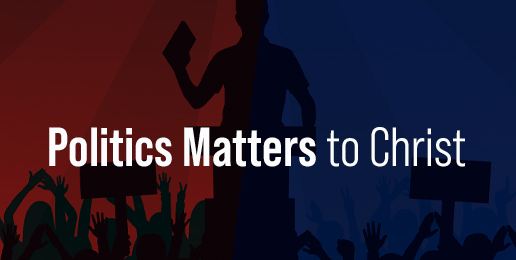
Imagine a world where two of the most important spheres of life refuse to interact. That world is your world.
In today’s society, two of the most important parts of anyone’s life—religion and politics—refuse to talk to each other through the “wall of separation” we’ve set up between them.
But biblically speaking, I don’t think we can separate these two. Here are four reasons why I believe politics matters to Christ, and why politics is therefore a religious issue.
First, Christ is Lord over all things, and His will is authoritative over all things. Because of this, everything is a religious issue. Whatever we do, we are called to do it in the name of the Lord Jesus (Colossians 3:17), and for the glory of God (1 Corinthians 10:31). There is nothing truly secular in the world—nothing that is outside the reach of Christ’s authority or about which He has no opinion. As Christians, we cannot surrender any part of Christ’s world to the devil. Politics, like every other aspect of our lives, is God’s domain.
Second, God invented community. It was not good for man to live in isolation (Genesis 2:18). At first, this community was just one man and one woman, but God turned that first family into all the nations of the earth—determining when and where they would exist (Acts 17:26). Nations are the work of God, communal living is His idea, and His Word is full of truth about how men can live together in unity. Because community is a religious idea, politics is a religious issue.
Third, politics is about people as they live with each other in a community. A quote shared by Allie Beth Stuckey puts it well:
“Politics matter because policy matters because people matter!”
Politics is not supposed to be an intellectual game where opposing philosophies hammer out academic questions of societal flourishing. Politics is also not supposed to be an emotional game where opposing tribes clobber each other for bringing on the end of the world. Policies always affect real people, so politics is supposed to be a tool for determining how we achieve the best for those people. It’s one aspect of the command we are all supposed to live by:
“Love your neighbor as yourself” (Mark 12:31).
Fourth, politics is always about people, but it is also about more than just people. Politics is also about the transcendent principle that binds those people together. Writing 1600 years ago, Augustine observed that a “people” is “bound together by a common agreement as to the objects of their love” (City of God, XIX.24, trans. Marcus Dods).
If there is no such transcendent principle in a community, you may have a “populated geographic area,” but you don’t have a “nation.” Throughout history, peoples and nations have always been bound together by the gods they loved and worshiped. Politics and religion were really part of the same thing. Only in the modern era have we convinced ourselves that we can be a “people” without a God. But Joshua knew better—there was no option to not have a God (or god).
“But if serving the Lord seems undesirable to you, then choose for yourselves this day whom you will serve, whether the gods your ancestors served beyond the Euphrates, or the gods of the Amorites, in whose land you are living. But as for me and my household, we will serve the Lord” (Joshua 24:15, NIV).
There will always be some religious principle underlying a political community, even if it’s as bankrupt as secular humanism or wokeism. The real question is which religious principle we’ll ground our nation in. And the church has the answer that no one else does. So politics is not just a religious issue—it must be a Christian issue.
























